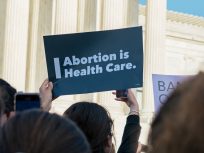
The labor relations system, adopted in the private sector and by many states for their government employees, operates on the principle of majority rule. If a majority of the employees select a union to represent them, the union represents all employees. The fair share system requires all employees to pay the costs of that representation. They are not required to pay for political or ideological activities of the union, however, if they object to such payment. This system balances the rights of employees, unions and employers. An employer benefits from this arrangement also because it only has to deal with one union for each group of employees. If the union does not fairly represent the employees, the employees have a legal claim against the union. The employees also have the right to revoke the union’s representation rights by majority vote and to elect union officers in legally-required elections.
The teachers, challenging the law allowing the union and the employer to agree that all workers will pay for the required representation, claim that all union activities in the government sector are political, and that it violates their right to free speech to require them to finance these activities even though they benefit from them. While the Supreme Court found this system did not violate the First Amendment in 1977, several recent Supreme Court opinions relating to fair share fees suggest that the Court may be poised to overturn the prior precedent.
A ruling in favor of the objecting teachers will allow them to benefit from the representation without paying for it, free riding on the union dues paid by other workers. The reduced funds will limit the money available to the union to represent workers. In addition, financing of union representation creates a classic collective action problem. Representation is a public good. Without mandated payment there is little incentive for anyone to pay for collective goods. Even union supporters may make the economically-rational decision not to pay for representation. We have a tax system because roads, fire protection, police protection, and the educational system are public goods. All pay to support when all potentially benefit, even those who never drive on a particular road, or don’t have children in the schools, or never have a fire in their home. Absent such a system, we might not have those public services at all , including when we most need such services.
Weakening public sector unions may have other effects as well. Less effective representation will reduce the voice of public workers in their workplace, and may adversely impact their wages and benefits, as well as their protection from unjust discipline. As government jobs become less desirable, it will become difficult to attract workers to those jobs, diminishing the quality of public services such as education, law enforcement, and fire protection. Further, if government workers have less protection from unjust termination, they will be less likely to blow the whistle on government fraud, waste, and abuse.
Fundamentally, unions are one of the few powerful groups that advocate on behalf of working people in the legislative and judicial arena, in addition to providing political support for candidates who support laws and policies that benefit workers. While the fees of objecting employees cannot be used for these purposes, if funds that are otherwise available for these purposes must be used to represent employees who do not pay, unions will have less money to support the rights of working people. This explains why powerful nonprofit organizations that do not disclose their donors spend millions representing workers litigating cases that challenge unions’ right to collect fees for representation. The individual amounts of money in these cases are very small. It would make little financial sense for individuals to litigate these cases alone, but funding from conservative organizations such as the National Right to Work Legal Defense Foundation and the Center for Individual Rights which represents Friedrichs, has brought these issues repeatedly before the Supreme Court, which now has a number of justices sympathetic to their position.
Reducing the bargaining power and advocacy of unions will exacerbate the growing economic and social inequality in the United States. Although union membership has declined in recent years, unions remain one of the few organizations capable of limiting the power of corporations and extremely wealthy individuals. If the oppositional voices of unions fade, the influence of already powerful wealthy elites and corporations will increase. Democracy works only if there are multiple sources of power. A ruling in favor of Friedrichs will diminish American democracy.
Ann C. Hodges is a Professor of Law at the University of Richmond, where she teaches and writes about labor and employment law and nonprofit organizations. Prior to entering academia, Professor Hodges practiced law in Chicago representing unions and employees and worked at the National Labor Relations Board.




